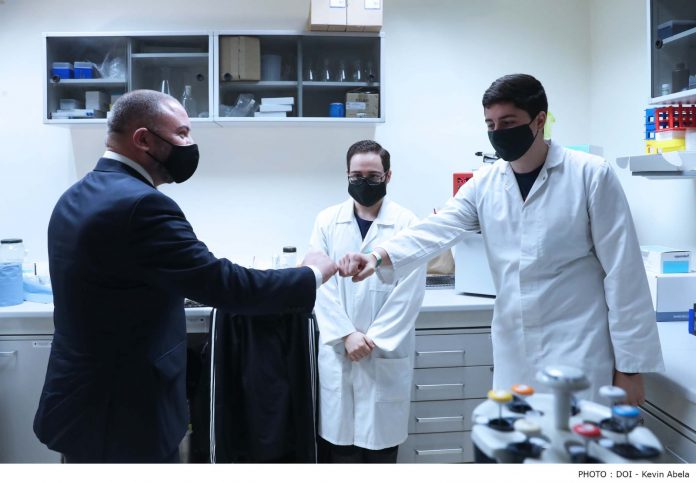A research project by the name Kme-CRC is being undertaken by researchers at the Centre for Molecular Medicine and Biobanking at the University of Malta, with the aim to create a specific diagnostic test to assist clinicians and pathologists assess the presence and stage of colorectal cancer. The patients would benefit from earlier diagnosis, which generally translates to a better treatment outcome, thus reducing the need for chemotherapy, hospitalisation time and the mental burden on patient and family members.
This project was possible due to €200,000 in research funds from the Malta Council for Science and Technology.
In Malta, there are around 300 new cases of CRC per year, with a mortality of 100 patients per year and 200 surgeries performed per year. Therefore, screening more accurately for early detection of CRC is of great importance.
During his visit at the labs in which work on this project is taking place, Minister for Equality, Research and Innovation Owen Bonnici praised the energy and commitment of these Maltese researchers, who are working tirelessly to find innovative solutions and ways to fight a disease which is causing so much suffering for so many people.
Minister Bonnici stated that, “The invaluable work of these researchers needs to be recognised, as they are the ones working to provide a new ray of hope for those who most need it. While research in our country may be in its infancy, people are starting to understand its value for the benefit of the whole of society.”
Minister Bonnici stressed that, “The government is committed to keep incentivising and encouraging such research, and nothing spurs us on in our efforts more than witnessing the wonderful results being achieved by these researchers.”
Principal Investigator Dr Byron Baron said that, “Through this research, we have improved the diagnosis of colorectal cancer by analysing changes in a type of chemical modification on proteins called methylation. Such research is important to better define the stage of the tumour and enable more personalised treatment.”
The proposed kit can decrease the testing time and make tumour grading more quantitative and objective. Moreover, considering Malta’s free healthcare policy, besides reducing the suffering associated with this disease for patients and their loved ones, early diagnosis also saves the country a lot of money.
This research is being led by Dr Byron Baron, who is assisted by Dr Vanessa Zammit. The patient samples are provided by surgeons at Mater Dei Hospital and custom software is being developed by Incredible Web Ltd.










